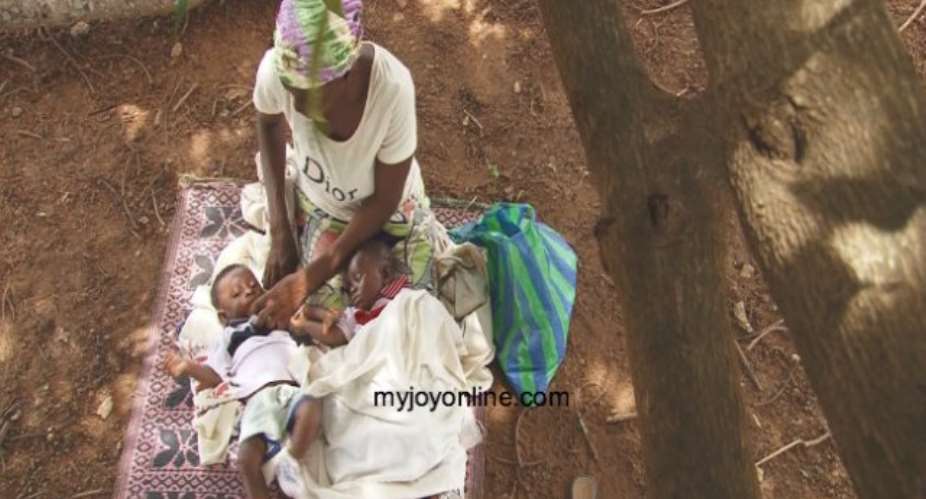The time had just gone past 9 a.m. in the morning of Saturday, August 8, 2015. Yibenena was feeling an increased sense of nausea and fatigue. Around this time, in Dodoma, the small village of about 600 people in Ghana’s Upper West Region where she lives, nearly everyone was already on the farm. It’s the peak of the farming season and knowing that the rains would soon be gone, every hand is needed on the fields to make the most out of the season.
She knew she was pregnant but she herself had been on the field, joining in the backbreaking job of clearing the land and sowing millet in wait for nine month long dry season ahead.
That was the morning she went into labour.
“I was lying in the sun, screaming for help but I could only hear the echo of my own voice. Everyone was gone”, she said.
Family planning services are still unpopular in many rural Ghanaian communities. This was the twelfth time Yibenena was going into labour. She had already lost four children at birth.
When she first became pregnant, she needed to travel 50 kilometers to the Regional hospital in Wa, the capital town, to get a scanning facility. The Community-based Health Planning Services ( CHPS) compound that has recently been built is six kilometers from Dodoma which doesn’t have the facility, not even the district hospital also 15 kilometers away.
Close to 400 women still die in Ghana in every 100,000 live births. The Upper West Region, the country’s poorest, is also one of the biggest casualties. A lot of such deaths happen in areas like Dodoma. Like many such remote communities, it has no motorable road, no electricity and no health post.
One of government’s solutions to these deaths has been to build community health posts called CHPS compounds, especially in rural communities to help the country’s poorest people in hard-to-reach areas.

But with a human resource gap in the country’s health service and a growing number of women who need maternal health service, these facilities are doing very little to encourage would-be mothers to access the life-saving healthcare they badly need.
“Even for the scan, I had to go and sleep in Wa for two days because when I got there they said they had closed and so they won’t do it for me until the next day and when I finally got it done, I didn’t even have money to come back home”
When nurses at the Wa hospital saw she was pregnant with twins, they said she had to deliver at a health facility through a caesarian session or risk death.
“I wanted to go to a clinic to give birth but going to the CHPS compound was risky. I didn’t know if I would meet anyone there,” she recounted.
“When I was pregnant, I first went there,” she said adding “they gave me only paracetamol and the second time I was there, there was no nobody there”.
There are two Community Health Nurses at the CHPS facility in Dornye which is six kilometers away with accommodation. But since they are usually on community visits in a wide coverage area, there isn’t a guarantee they’d be available all the time. There is no ambulance to convey women like Yibenena to the facility when they need it most.
When a passerby heard her call for help many hours later and offered to help on a motorbike, Yibenena chose to go to the district hospital rather than the CHPS facility.
“Six kilometers into the journey, seated at the back of the motor, my first baby came out of my womb. The bike run out of fuel and I had to be brought back lying on the shoulder of a stranger back home to deliver the second”.
The pain, she said was unbearable.
Strangely, she had two boys who both survived this horror of childbirth their mother went through.
Yibenena was lucky but not everyone in Dodoma usually is.
In a town where nearly every woman has her own story with life-threatening delivery, pregnancy is now a dangerous gamble.
“We love children but giving birth now in this town is dangerous. We don’t even have mobile phones to make calls for any help when we are in labour. It is better you don’t give birth”.
Watch the video:
Story by Ghana| Myjoyonline.com | Justice Baidoo | Joy News | [email protected]





 Akufo-Addo commissions Phase II of Kaleo solar power plant
Akufo-Addo commissions Phase II of Kaleo solar power plant
 NDC panics over Bawumia’s visit to Pope Francis
NDC panics over Bawumia’s visit to Pope Francis
 EC blasts Mahama over “false” claims on recruitment of Returning Officers
EC blasts Mahama over “false” claims on recruitment of Returning Officers
 Lands Minister gives ultimatum to Future Global Resources to revamp Prestea/Bogo...
Lands Minister gives ultimatum to Future Global Resources to revamp Prestea/Bogo...
 Wa Naa appeals to Akufo-Addo to audit state lands in Wa
Wa Naa appeals to Akufo-Addo to audit state lands in Wa
 Prof Opoku-Agyemang misunderstood Bawumia’s ‘driver mate’ analogy – Miracles Abo...
Prof Opoku-Agyemang misunderstood Bawumia’s ‘driver mate’ analogy – Miracles Abo...
 EU confident Ghana will not sign Anti-LGBTQI Bill
EU confident Ghana will not sign Anti-LGBTQI Bill
 Suspend implementation of Planting for Food and Jobs for 2024 - Stakeholders
Suspend implementation of Planting for Food and Jobs for 2024 - Stakeholders
 Tema West Municipal Assembly gets Ghana's First Female Aircraft Marshaller as ne...
Tema West Municipal Assembly gets Ghana's First Female Aircraft Marshaller as ne...
 Dumsor is affecting us double, release timetable – Disability Federation to ECG
Dumsor is affecting us double, release timetable – Disability Federation to ECG
